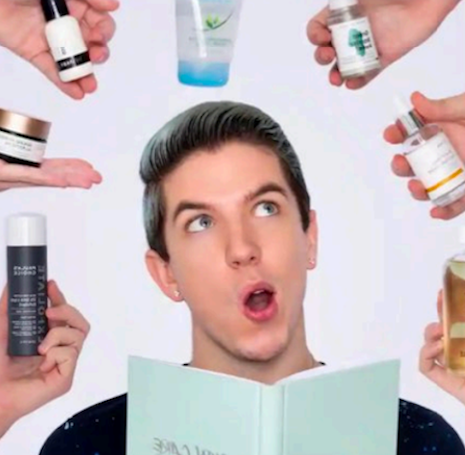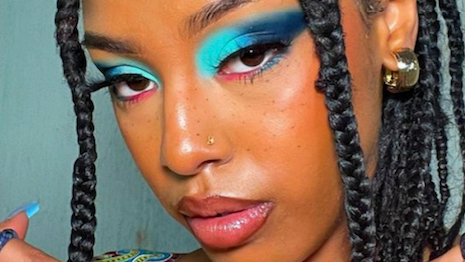The beauty industry is expected to reach $463 million by 2027, and young consumers have a considerable stake in its growth.
As a cohort, Gen Z is reimagining and challenging beauty norms, prioritizing personal values, self-care and authenticity when it comes to purchasing behavior. In its first Gen Z State of Beauty Report, Kyra Media explores how Gen Z engages with the beauty industry as their evolving attitudes toward culture and content impact their brand and product choices.
“Gen Z has the capacity to both consume more because of all of the points of discovery for this audience in regards to new brands and products, and consume less because they’re able to make more conscious decisions,” said Marina Mansour, global head of beauty partnerships at Kyra Media, London. “Gen Z is also putting real pressure on brands to change their processes via social media or across brand platforms, be it decreasing packaging, pursuing a cruelty-free certification or reducing the carbon footprint involved in creating products.
“It is also the first truly digitally-native audience who is direct about telling brands what they expect and holding them accountable as a result of all of the information that's available.”
The Gen Z State of Beauty Report was conducted in May and June 2021 across the United States and the United Kingdom via Instagram with 3,500 participants aged 13-25.
Beauty according to Gen Z
Skincare has become a widely accepted signifier of personal wellbeing for Gen Z, and is considered an essential method of self-care. It ranked as the leading segment in the beauty category for Gen Z, with Dove as the top skincare brand, followed by CeraVe, Nivea and Olay.
Three-quarters of respondents claimed to have purchased a skincare product in the last three months, and a third of respondents claim to not wear makeup, focusing solely on skincare with an average of 3 products as part of their regular skincare regimen.
 Gen Z is a highly educated cohort when it comes to skincare and cosmetics products and information. Image credit: Kyra Media
Gen Z is a highly educated cohort when it comes to skincare and cosmetics products and information. Image credit: Kyra Media
Self-expression and creative freedom are hugely important to Gen Z, and experimentation plays a significant role in that sense of self-discovery. Gen Z sees makeup as a form of creativity and is seeking inspiration through video or social content.
According to the survey, Gen Z’s favorite cosmetics product is mascara, with Maybelline as the top-ranking brand. While a third of respondents identified mascara as a must-have item, they ranked foundation as least necessary.
When it comes to brand affiliation, Gen Z expects and demands certain standards to be met by brands in terms of aligning with their values.
More than a quarter, 27 percent, of respondents have actively purchased a beauty product in the last six months because of its sustainable initiatives, with the environment and social justice ranking at the top of the list.
One-third of Gen Z respondents are looking to brands for insight and information, presenting brands with a major opportunity for education.
Gen Z also wants the scoop on beauty from real people who reflect what the world really looks like, emphasizing transparency and inclusivity as critically important.
Online reviews are the most influential on Gen Z’s purchase decisions. Gen Z ranks the most open-minded generation with more than two-thirds of respondents welcoming content from beauty influencers who are of a different gender identity than their own.
TikTok reigns supreme
Respondents also reported being more willing to add new cosmetics products to their collection based on a recommendation from a TikTok influencer over YouTube or Instagram, although YouTube ranked number one for online beauty information.
 TikTok is a top source for beauty information and product discovery for Gen Z. Image credit: Getty
TikTok is a top source for beauty information and product discovery for Gen Z. Image credit: Getty
While 2020 was a difficult year for sponsored influencer content budgets, influencer marketing platform Traackr found that TikTok saw a 164 percent increase in sponsored beauty posts and a 481 percent increase in engagement.
According to the research, TikTok was the only platform to have seen substantial growth in this area while the number of sponsored posts decreased on other platforms (see story).
For skincare, specifically, Kyra Media found that TikTok has become the most influential platform when it comes to new product recommendations.
Authenticity has become a driving factor in social advertising, and content creators no longer want to endorse products they do not trust.
During a virtual session at the Vogue Business and TikTok inaugural Technology Forum in March, CeraVe global general manager Penelope Giraud noted how TikTok has allowed the brand to speak and collaborate with influencers and content creators authentically (see story).
Increased exposure to viral trends, beauty hacks and skincare insights, particularly through TikTok content, has encouraged Gen Z to push boundaries and innovate within the beauty space.
“TikTok has been the home of 'New Beauty' which simultaneously celebrates beauty as a form of creativity and theater, allowing for huge talents to come to the forefront of the community thanks to the TikTok algorithm,” Kyra Media’s Ms. Mansour said. “The platform has also challenged more traditional beauty norms and expectations, creating a more inclusive space where individuality and your unfiltered self are celebrated.
“TikTok and YouTube are key to a luxury beauty brand’s strategy with Gen Z because the trust that this audience has in TikTok creators is the validation they need to invest in high-price point items.”
{"ct":"f4u02f9K+82xfHkAfaQnjQsMHPXw4NuImYMso0aJ4xJlluCLFilj2v8uOwur4EAQleBsshHg2mf\/wBsr7rMfPxupJTnkxLeZDVIs5gzfpJt\/3tIH1pu1Cyi4pMTjg7P+lCdBtrKq3nmZQLZvJnrvpXkYCJ4fBo+P5aMmxtEtLsTGDNgY+lg4ggItlnXcibue1xM77jsBJFJ256oZLj7bO9KOdc2z5KNpoDey6XKuojMwa4IkfeV3JiLGcd4Yzo08Xh37r8pZNl2M1PfDKmHh8SirWLDLbksVSu129uJsDX93C7q879eRLs7KpE+JiCDkuwN7WT8bllLcvmqswX96YgK1cp+rgmL1MTVb9ql+1NX67DvrPoJtzf6hWXgRfDIXGuHmCfAt3HrxTtEJkmthSi0CKB3ko3rbIx5N\/4mTUdSW+wCKjjcmaomhqiKhhZYifP49E+HcTHTOJezNn+34EgVbOiXJeaS2vQYE+pL4tW5S62YqJTq1G9lUJN7bwAZYpk6nk7\/xX0xC5HQkg3U5dxVluL3gKWWmcH\/vUZUKn8KlhHF1kXGctOIdMoAvF5VnuYIfAwzD46fKNt+Rf6cISdX4Fal9aDBpLi8okm04UJ6xe08T\/djh7SQvU3A\/8qpd4CnE9c0xKqhIJBm3N3jk3g4YMvMcjKy5xeukGQ6bCUzm7mQwAlwOqWnnZ7cCIuhjRJiqogOM555Ix77rjO01uHcbeo3CZ1YVcPk8XzzIiNXYiDj2bMYvVDZd1b+i7qeToraQLlF+IuE54ERrOij2v8K1ck24lz+2amryAqjjHBCp2kvzAerMMcHYSqwYfpbdRlg17WyCS1y4YKfRBsagYTPT0aQgP92RLYiAYAiOqfphjklgH+vE4hhDn+IcG92S+MYuq86yCgD\/qhxV373fluRCVVJfOdgv8yMeLCU0Lvr6wvMQ\/C+uLB5+otDu0xkiC6ajhKbFcnrrRe2ypcsEyo1RmCMw7AOUw9bzlIRBh6jSxbo9A+YF8ZQo2mH1EwGc6+evR6\/wPb6lpPkSOwhTnn+v2z0dX6Ml9Awx03HtraEIKV18N8KRYiKXASBOSL7CY4llzsCiRFVKcoM2SEXsFIxAyv\/lIxffGPGGzu9iLKt\/6Mypk2T2VgUsdvN7\/IFhpLlhlX+6V0x9aCwZIgXsbdKXewhOPvv6iIuLsXqWJaewoYszVLnDfPXA+klg\/aE9Sc5WLjhNVBIWWfZcPN8jamz74xav1eS3O50BjLikXBhG8h7Ao2ZbYfzqCEKtPS6DIz16rKm+9Kqg22gg8DcPtRdhaCRuFAspuUjBH7DhXhiaRYAV+SbY29AJDW77rvaZgzZi146HJXRBNmAdjE6FPcEvlTp5xvhRgUVXWBAZQY\/jCrIyPAgu5mJr5C0L5D41dOUsvsEp9ZvVWYrkleKJXyYmxv5s6Ewx3ffoE1fHFmaFF2R8tZaC2F1xYIbocxEV8cVeIbtTc8pMI3QrNR75bG\/ffKiyvHctPvBFcOlOl04vWOlqUB2CWqDBS\/N8GyI98BVx\/yffPjLI4No1EVAaZPuj7UqDvRjt0FgxcW8I9esKP\/74F2gcafrFhn6689oFMToF6SIdU\/1VzrjK6LVh1+Tr8nkvNa5ILQxdBYdWcKhRx+yJOA9kPyDE3TfyfMs33svDvtJlEl5vCqe7tSQN1s5FoWGjV4PAtn9XVxIf0QDeTNm64BLey9fDrU\/yRTYFVX52z6z1Mm23V0FMjhEfqPMOeXe58UQzhMMj3AxWi\/xA+ww81lcx2\/6f\/72eZpMiRkq90mTcsbHmYjpJ3qTjqEkxK3bW0\/6m84lvmxNXLSRyOxli8DrOE0ypVVFlP7nkzyA8Ps3xNTRVs5sOR4PMnNGIMz\/qnGJHSLIHHN\/5yKV5ozG6PS2XbVxzJrDhmZmKKNuVNc4oGxfH5oen+dRM\/npIuclyneH2JbbWXlYFRI5SfZGW9i+fcU5d\/Z9U0XCR+9LetQAZSQC+NyyAoAmQ6M8y82BQAAmEgJ3Ywdy91FKe6bQQIHgCaaUD7TJUEfF6aO19ovi719qnm\/c6JJSqP\/DRGAEIpFAbYzsqeS9aiI9erNKII0tqe9l82wDvkiZVOpbZ25dUbCoApxNGSK0f6eUBliFHcacflRIKW77DfZR9UrB61tAVRo+XEOYB\/FUe\/vXXrn8XwXGnjX0ehzn2+tmX2GEkAnLNEZXOy1gLX1yOrPWCPrWBWnjhTB7VOMbiPjYF1PoR19BYw+1DJlCtQQMBci+4awpFhkVcaxhIdRaIwCCe\/vXAdit55ayWK3RHXD6ueMfOXQMALuHNJ3\/pwN6rNxLyjhlRZtNccL09KkdMrFZNa1y8fUIrk6BEJYh+ekf0lYmsGwP5UjxZgjmRI2DyH3GUXXO\/iTFOLXuOwax+buSh04\/+U1rbntoOSbnKb1hHJacABWZYT6KlRaqyII1aX1PM1bRCCIlwrmon9rzYfeqnFXuCK0Sx307PR\/1tPumZgtVb51hSN67tFDYFcSCOUTddXwMETIcrSWECP70Wl0tLnp+sI+bMPuOlA2NkQ1nyRSK2REnZdz8p\/K5uH9hLJHfJRoFRyOmXr3\/rlqW6JzOFUMM7z3miRMYtqE\/3hUas0ugr8agS4jjupl7wsSZ\/du0VWj4zi0ZHn9qY3r7ofSABXp1za4\/mBKXooPCWECBr+DevXxKrhek2Zx1J2e6YT3ZrunppGsip\/pX8TmRCzqUEs\/WjS5in1kJA9Hju+XAXyjhNWmvcJFRxbB2qvFMyllVbecKre6brBPdUPiML2PcOe0HAiDiWnN+uJ1gZzHXaBYKoC5LLHRQsSnvZ4+C6g4N\/1atz6cWB3NChN7kPfVcOw36gjXWeAA4pp3vi4\/JjxxA4MG9t9XjTKViOov5s0L4qPL8RzupwMtnnffRg2EU3jJvnFyj03kMn4AW6YzN18mzIv9PDXwfxLv627SOcj859r3z\/Ev8uillpW1wNkRd5GsQ7MQnJmotSoJ9nhVnQw768XAOOoQh738uefeZZc60vTITC6C1c+VrH1fXOxpZy3GMunDPc\/dUtyYSZ+Ex0qCJvFAkjHuMih+VbiwcsqqihC7x7VBLO4qDMGR4lfKCOMNSKFI\/YZtyWncyaH38FXVfOE4eBNk611yJpLLOJuiVCCMgAhKGYdPk6ZJujVT5bYlSFUzeHSBLylJw1RZhUrIzRKY\/ooxM+LflLMPEFZdh3xYP7KRitxTzwACAK1T0Pv2qSm36LbZBrpox6zgeG8Joby6sFOYTA5LTBhvwXXoHgsLTO94BJrnljZhnS1wspaBLmT+j8bfPpmRIC5HYMIooPe\/PbTfJ5vP4kAjWKtK44AniVZ3B3obKDqQva+wSgBerxhcEuiK94szxTTBYNAg\/QUuD6Md\/8qv39FjXplw9G9yU0J8Rjrzxy6kc8drzPKH6i\/RThBrdpVdkraWWG5l6uGD559SZZo84EYe88ZWUWlAkJzM+u2ckMtL2DPGZNmofCBvPdvAfPSiECI3x\/BnpEKaU8f8iPMe3XjmRbTtASZq+NhTNSjlivxJU7udIxefuGjX0fvUezj\/IVOF9E9XABDqdopNRLqDSqE7Znw+mRl30kWbKWauSUucMIgc1KWDQi+pLQ445xfCnptD0w6T2Fyhk6Sjk5gaPtaoGOwvdCsvXqtBmRWqTQjI\/OBXiuZ9wtaaiRVNTkGRP3CvuUSHQ0o4T9dN6A8DhX20Oe4fWpmmhgjKa7YeMZ8bY3H8RaHy1Mz4iSN1BfuGo7Istun3eWerVPrrpYzD391Tz8r8m\/fzFHE\/LRyvkqWnUpNjK0fKa3b\/cqaZ9uPAfioCkw6n58sMglRE0VsMDPRZ1kdZx6R\/U2ypbIsjryFnbml6qikIlCdKM3rAFej+wQLjyJ0FeOxCYagAiVwwQMVx0kDOxkciX5z+s1MCWRi8wN0Pm6eGlbNcmyTksaGTjEufsvcxVS+ya6hpy45MOPleKzihHtpmD83gI2DVF6QaKkjTjGfSkJ\/rstd7KyEf3inBO9pKXaFrC9XmqTjqe1h0fhsxddrwWyvKbjyYdjKTm7skwRnfqv5+DkhxFaMTpZlfhMmJrdyHEReniafs94427n2hXDlsIv7+zvzSIdq\/fWcnR7Ng5K5z\/kB8IsBDICJV7dqeQZdEJEVK7DAaU7uoClFmNfvyKiJVk06A6X9GodsrgHhqfMkv57MpFrePH\/XUUqWMVZM2sXI3EpqsQaiIZRDjL91ZcOy2rc7sOJHNxYFzlFdwreUOr77\/cXtofxX0JZ\/RNuUsKfvBEIChZbhai63OGmv3Fb5qOmtbYT7eSkj+nXZyjHmikFNe8Dr5WuWWfVH9cQMX6lyWPwUOEiYXGJNM3vJzAHeLnHShr62CuYCSP5K5hOoGF9NcHQPeISTvYllpF6Ejvk24BEu87E9m\/FNDGYfKrvY69PzlDuWWoTTl\/lBW31lsCmS4SplUZZFCF3EdfpzG17WJgpUadaR15\/8SHJzeLt3Dg16eIxKJm9dVXRl\/BwyJz6oQhKZIkQKCKyUjiw0FW36duJ\/AIRT0qW+JaCaCWUyTFuV6Mv0xvzVCyHeEk6gyDmY\/BE0V8yYIABsA9KzthBxD3iikUqvBEx0uyciqOVyAFH9bnq4DInRcIl5pJBnkc0Ybo0Xacs2HqjgYpuF6GBaIV6k+6e+JOrBeIyXVUPWJFCnQLpe\/jzMmqzHNvi1Vps26BpA\/qLqrgJNM1DiC05Ea2As1sqXF9Qvpas0nr7YqWsoLKN3LHhh7TlJZnF8CuaMGwZiHIyHRJC\/gpYa5MMNd51doGFW\/x3O1IKyqPA7evgPKnbtBRei8Tay9sJwoWpNQQU5PvSXEO+8Ob3ZP0tBG0j1sxdmnatBKFOY0Tj2GniH7zXyOMQxM+wuGWs7RNHK4wys4mgOrX2Y6rHBBnRXtmpqqzDkihhes27Hj0tqSW+IQU6XLPkq8uvD9E6irSx78kJ\/5QcNjFlSqLK6V6dBTt9xg2W\/M2PGgMNiKWmf72eTfSoQGbXdlNjwP52Qy0d\/5BVIKDuHZtoFirPfQALPpaH3sbj\/EPsfrh5aj3cGXf6zrzUSrRIQA\/CCBM078iwqzpczR7XiYCIm7fhFu4jhbjil\/tHeJAxsHpIx46ZRCBn+9CzLKJu0ZSH3FFkmHeHokKK22\/ijFqyDhwYUT3+ctY329PKCrb+YFGgs+nQbERoUoFv6Vi4p+to\/gS2tCA2Mx5HBsx+aaZRxFALlOiu2mstee4fy+1mAEfR1oFSHXTKgWYgrlHogV4LXuw75RXcvs9Kj6qXKXQZMf+zAIJqT5LFwNwOYdAxWrvlsuLqwtG6CmbbIO1VbDKgUsYIAxRnSdIOLMUeBiCknBJIdggVRClVH5mF\/uDYcGTqrNN5aPF9\/Blnfg3ZCH1ANUqJLnOSaKNlEXjnWHrhIxdjUG7xi1sPQNz+SIaicWd966FzM+K1xazHcOyYtOeU+LOP6Zsov9b8P7T53ppw5q1eSNNiqjp3hsPZakL1WHE4A2k6xLz6FNwpACiENzeXKhHe0uFfgdbOYC7rA6Lg+RPXaFjd2vR1MzxJYyowzBsBQrgVE7PP8BtmLz1aHcnOj25+DKYUz+Cqe+tia3T7CORq1mb5EnXo0Wh\/OtS3nEjUSmnJ\/\/GQmrLuD7U5mPvKN722RbpI7EHOTn8bYF\/Dc9KkUYjSpRIndmOcgDqw0wQJshdz6nhMzGMPZ9IH+XAY2q\/Zl7TsKDfwmfIz9\/MW2OiqWPyC0CndGB21CqVWDjrC4596D7ZY7iCL5YCGJ8jxjV+WKydQkCmmB4+rj7n5EoZr+t1Hdoj7UH2CvUU72q0eITH8zW1IgTDc2CW9zb8hvVKSA8vXDz9Azcoyl+ky9\/yY1sXUdJGRKDPn7CCao3w0B9PX0dRxF2j4KBekfIV0UIuUDB9vxK5l5cfyxCgeXYeo7Uu9W6CZKUF+ufHj25v\/GzndgHC27IxaxCppHQD3x5xtmmoOVG66p6COr0UjerVcrQwCegz1l01pq2lW08XQDXpiHP9i9EGBF625GXo5gmHhExywE\/MsR2Vw2WtOm9xMlkbVh4uAjxWEccC9At\/d4hCNtxRO7qrnkZpj0FZWnfHU8odo0ooPSlzaBxKycUQz7FfbyqxgL05nyQArQIfowdRoFsRzo1Vm6mLYymE\/y7nSDMrb2g81ZcRuCPv2gc8zsxcjofukidhJcAW7TWdbY68i\/a1WIkdrVAUhZ77r6AXo\/Ouv6T3qUPyniqDo7WSv3Iu2yNYhx22Q9xS4Ns6x7Ygad4JSzXC+z\/Sd765EjOxpWqvfAmd80Zdl8nr5nGDsk2tS8zlsje5\/F6SqKWSDGs92fbkIOCnz7r5Qa\/vYYh6CYSbNw+JcAWU8UxeersAVEVgmj0d435IRk698HZHMVXt2rDEQvx1EtspnVlUmzydE+6X0PwZ9U3+AmyRxsg4VEBJsujbCuW\/Ox1hec4saaN3GhwxCBLfwbsWNQ0YzfalBKTuQetbBRfN2jZtKyP1XCX6mcgZnfySsyLu5Tgw1TtnjVq6GFH6nIuNrUFQq4KSbi8d7zrOy95yjA97VgMoUeRr94aa7AEj1doZorCQp4DIkJ5Tji+pICor1De3af8MUg+kdzPl9694uwIYzyanqSET+1YtBZVm205GFTdOdGRR3AIV\/Y\/5OeKrSwpNql3OVxtmyb98osf1xnB\/WrwOeCSPlcPP1wnQkjjv720wkFACfe3QJ0w5WA1P9RrHJt07t8GM\/A\/9dr2oiaLd3AHkTyinumD+iL6ZYcrWIJvSUOrjI\/oDDrctOM5Es6UGKfZpmMn3+\/VD95NuNdBgwEcDp3Qsv6ixdpt3D6XK7rFRMz+FWl4+CvPpzTNo7JoRc63J3voFLYpmfXLX+rSzWy4W9ZfuNB96OopVu3FISDaqOjqFb4YLFL\/7jf\/7518J2a2L+ETGJpOw\/6ZjZ1FDFKLu\/iG\/D4tVI9ltCF764xU6v3sI5x4GM6l7Zg2D8tff3s\/W8dirjvYl5NVGJwTyBUILDmtlUKg6acFB9AF6VhzOzj244pq92lx4KNqAyvt3EK2Li5hOLkuY\/UneBmdxcVHxI74Pc1RhTE9yGesudNMX0xhOONIcfdrpYm7ajeHdk1IAtY7jLPCMMLWD86y7bcnE1U\/CUQAgIwTnI9VO\/g7jr\/qyb8CNdk2DZxRqKaTEbB4fhf+QbsJtFUY08SN8\/90EQVI2Hu4jTfmqbDUtUX9GcQOVUEuSHfU\/AlMMqhRxGUajiWYzIXzmMw1DtDXwu5RzHIS2hELMsudak5AFhknJKfxCNc04k\/VDPLS0K39b0jYSStKmEUXEmpMbOoqOwu+JsouXd04+u68URF\/zMdEan0WW\/whos6+V+Mh0+w+sv1rTtOdThoSD64LU6V5E2XEGGffdcZkw2aGQqNyVHNhyvs4+Cl5OB178Xy0wokHwlCZIChxvbtFk18aGQqVnOWzCHFmWYuPiNqg8RDC4+wrVWImatQQvyQOAsU3L8ZZRyyvbEAc6Fgf3uPH3PlRyPjvgTmAYNm+\/dRhlK7ApYzDfh\/C8GLQrrBF00lhniZSgc0J3ezt6U4b3pS5r9zLrD5s6N6M+ymSI+n6OaL9WRVejmHMad6Be1JiRYffXoMbvzatng8htZVDVCyRBexM8aYFGPaDfZTdZMshM7pP0Mi4PL5fyqn+WwrHfX9IQjyk9rIC5\/GSStUVshhH7zy5qlhCavkAZwQgCvGrwpRWGmINIjY\/yx7JbYzw5ZCA1ZYwRDJqMMGauY0oaYSFD9Qevgx9yI11fk\/fcls2VQwqfAbFcNLxb7M38x0lFO3dogA+67NEEszTES2jckQtDPdeQUbQG3aV4+T37N4u+31YPlRnAIEE0hAFKJ0vJXQ3fGi6n5+Kqee5hozKwEKKBolF2hxX9RwShoUwnH8XZhXCY1OhB0lZt+kBzxQmUvxRl2TZ51UZd3X20bb87G3u0nu7HmEKSBHsvxHXE4gFBpiszGpbZuY2AV+arrXfwaCEOXsbFNVyw2qa2dH2dGuqUCcWTk2HBLj5JEOCDm73K4rpkmUzy0\/MEKx74W2tfLKiAa4SnQygsar5Wzv8DAiu1AL2A72ipbHlaF7gm0snDcFz\/lkbGWL1AI0Q9QfIIRCKGlZslsDFPz1U7Trev+X46ybTjKFvYnDSY7\/a8ADi7fzsttFXVMAZfMPkkMN8FyMUdJKDvuAGDjfZJ1IIC664qn+uDBK\/ZNAYp3ndXq2I9UlOBfUxELr37I7LFlj3n7IUuz5tcB3B5wHr5240vPbuz7bIIL6cFGkRsyeIXzPrJpu1zBYsUNOOK4ChIPPf7PStgUzvUhPzUIi7GD\/Zee\/eBLeove4gBP7XSws14ktn8X8H6TGuUhpUU7M1o9AxjPvqV7T7puny3VK3yDsXOibNRiDQAV+TEbFKZ4xq0\/ManWceqre4DESMAFsReiPKSNtKsA9vxugDh4TKkTUNEaVXgkMGnuMUSz4sL5z\/A10IbhotkC3\/Dl4CDDBjzqcBTyvFadTRoSm55yaoNEwctAOleU\/kh0hVTRwKba9Voi3gyBhv4xebXwsGXXX1j0Lv\/CSMJo5wWx0XpP1ql7ZIm0FIDF57rBom2uHhBlOse3YQJUNgmQJoZVZaMg2DqCmwxRa0zRiq8raacbibQx3sIx4zq74Vx4XqqUmRHrdk+oDHyoNISMAtwdwklmId4TVnIdqkHVyKa0cBs+3kPpNYfuomtEKlG6ICFeKkbUec6p5hNOHKIACN+7\/UAuib9oeZqeU1mhUX5rQnuL11sy5ld3DpiIX5+D42+\/TeZ8F9vdzqwsD20NWEa+DL1ZuMVTfAl\/\/zGPsNeqMn9eTH9wJO5ZznMGB+cOzoUUQyLOtJXeWa9Ry\/AiytPVnItxzLreSaRDIHYJfFxqk4rQ8etiuybuOyFmWhQIdgj3TmvLr+cjYBwI\/1KbEXZiqdK++LEt0Gt9RtevrWZYL0qymtmkcQfbKX8V5zsqgFX+JW3csEv7jbrgUsEMTHm+5grk7CgUa1R5GY415ATUgVWhYqiRxWoXU\/csCXRTYdRnoDCqgtYVlqly3hVWnKgJrTpYHrhNCicNHY7nEoZEr7lKIWYUy4001cX6F4hhhfkxnRGU3zaX+4lEf3Jk7lXAEfTBnP7J56s6Xk3xumdkddGGptZAWj7+zaYt0zzhns7+dbCmDxAJUyhh3GjdW+WbpcJ4F1dXpwD7FHh\/L1wkPej17bJI7J4FOxfnArdic9ta3r2X\/PFOLUg1axlTO\/JX2fIjAR20VCDNUy1hjesc\/gKgcy3fKAlxh8ByltwmRRnRQXFoALKuEGm8x0qGznCPNT8bGDQFS0C\/BwPIZZEGz4Rh6XQE6gDwWnEfZ+mIS1MtpVuxYho8TjyblvqjSNnripVBIcXrhIaNFtmERCOUDDOsQQ2mAAa49zi7Lg37wZnN\/7FR7Lngr0D6l2CZNi1kjVHjrkeJtLcB6PxX0RmSeejNO\/Op5V6AZd64r2mbvO0+xcyQX58hnxZe\/xr6A9rgfdPs\/+h+P4WIj06Iht2ZxaXi5FOayIVqi\/FtrhMwCOASZd3yZTDXGtLEYESHJpPF50mZUsHmWSMZwE52wXaIcStsYbcHJ+svIXSdlfFntZa5eATzDNlmHMPhUGM\/rPt07BMvThT6DQl0mPSGiKVLt81T1vV4tBhxxsz1\/skMjvbOqW8ScZCClfoYrTdUYUqtEsnyxWDR37Idtm2rfMoOo1X9242I\/WGJpUZw","iv":"df13cd791abf6c22cbbb6e9c6e9f7e66","s":"de43f5b1682c25a6"}

 Gen Z consumers are bending beauty standards through an emphasis on self-expression, self-care and creativity. Image credit: Kyra Media
Gen Z consumers are bending beauty standards through an emphasis on self-expression, self-care and creativity. Image credit: Kyra Media  Gen Z is a highly educated cohort when it comes to skincare and cosmetics products and information. Image credit: Kyra Media
Gen Z is a highly educated cohort when it comes to skincare and cosmetics products and information. Image credit: Kyra Media TikTok is a top source for beauty information and product discovery for Gen Z. Image credit: Getty
TikTok is a top source for beauty information and product discovery for Gen Z. Image credit: Getty